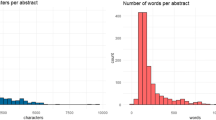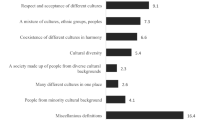Abstract
This article investigates EU foreign policies regarding Human Rights with Asia. The perspective adopted here argues for a consideration of selected, social-constructivist, perspectives. The article emphasizes ideas, identities, values, educational exchange and human rights in EU policy towards Asia. Through a number of case studies, the article demonstrates that there is both an ‘enabling’ and an ‘inhibitory’ human rights dynamism in EU–Asia dialogue. The article suggests some ways of translating this into policies. It proposes a more inclusive, ‘holistic’, understanding of human rights discourse in East–West relations.
Similar content being viewed by others
References
Aggestam, L. (2004) Role identity and the Europeanisation of foreign policy: A political-cultural approach. In: B. Tonra and T. Christiansen (eds.) Rethinking European Union Foreign Policy. Manchester, UK: Manchester University Press, pp. 81–98.
Antolik, M. (1990) ASEAN and the Diplomacy of Accommodation. New York: East Gate Books.
Archibugi, D. and Coco, A. (2005) Is Europe becoming the most dynamic knowledge economy in the world? Journal of Common Market Studies 43 (3): 433–459.
Asia-Europe Vision Group (AEVG). (1999) For a Better Tomorrow. Asia-Europe Partnership in the 21st Century. Seoul, Korea: Asia-Europe Vision Group Secretariat.
Bainbridge, T. (2002) The Penguin Companion to European Union. London: Penguin.
Baker, P. (2002) Human rights, Europe and the people's republic of China. The China Quarterly 169 (March): 45–63.
Bartels, L. (2005) Human Rights Conditionality in the EU's International Agreement. Oxford: Oxford University Press.
Bonnet, M. (1999) EU-ASEAN relations. In: C. Cosgrove-Sacks (ed.) The European Union and Developing Countries – The Challenges of Globalization. London: Macmillan.
Bretherton, C. and Vogler, J. (1999) The EU as a Global Actor. London: Routledge.
Checkel, J.T. (2001) Social construction and European integration. In: T. Christiansen, K.E. Jørgensen and A. Wiener (eds.) The Social Construction of Europe. London: Sage, pp. 50–64.
Christiansen, T., Jørgensen, K.E. and Wiener, A. (2001) The Social Construction of Europe. London: Sage.
Christie, K. and Roy, D. (2001) The Politics of Human Rights in East Asia. London: Pluto Press.
Dearden, S. (2004) The reform of the European Union's development policy. Journal of European Affairs 2 (2): 17–24.
Dent, C.M. (1999) The European Union and East Asia – An Economic Relationship. London: Routledge.
Dinan, D. (1999) Ever Closer Union: An Introduction to European Integration. London: Macmillan.
Forsythe, D.P. (ed.) (2000) Human Rights and Comparative Foreign Policy. Tokyo: United Nations University Press.
Fort, B. and Webber, D. (2006) Regional Integration in East Asia and Europe – Convergence or Divergence? London: Routledge.
Friberg, E. (2004) Burma/Myanmar and ASEM Enlargement 2004: What Lessons from Cambodia and ASEAN Enlargement in 1997? Brussels: EIAS. European Institute of Asian Studies (EIAS) Policy Brief, 04/03, July.
Gilson, J. (2002) Asia Meets Europe – Inter-Regionalism and the Asia-Europe Meeting. Cheltenham, UK: Edward Elgar.
Gilson, J. (2003) Making uncommon cause – Forging identities on the margins of ASEM. In: S. Lawson (ed.) Europe and the Asia-Pacific – Culture, Identity and Representations of Region. London: Routledge/Curzon, pp. 50–65.
Gunaratna, R., Acharya, A. and Vhua, S. (eds.) (2005) Conflict and Terrorism in Southern Thailand. Singapore: Marshall Cavendish Academic.
Haltern, U. (2004) Integration through law. In: A. Wiener and T. Diez (eds.) European Integration Theory. Oxford: Oxford University Press, pp. 177–196.
Hill, C. (1993) The capability-expectation gap, or conceptualising Europe's international role. Journal of Common Market Studies 31 (3): 305–328.
Hill, C. (1998) Closing the capability-expectations gap? In: J. Peterson and H. Sjursen (eds.) A Common Foreign Policy for Europe? Competing Visions of the CFSP. London: Routledge, pp. 19–40.
Hobson, J.M. (2004) The Asian Origins of Western Civilization. Cambridge: Cambridge University Press.
Holland, M. (ed.) (1997) Common Foreign and Security Policy: The Record of Reforms. London: Pinter.
Holland, M. (2002) The European Union and the Third World. London: Palgrave.
Holland, M. (ed.) (2004) Common Foreign and Security Policy – The First Ten Years. London: Continuum.
Jachtenfuchs, M. (2001) The governance approach to European integration. Journal of Common Market Studies 39 (2): 245–264.
Jørgensen, K.E. (2004a) Theorising the European Union's foreign policy. In: B. Tonra and T. Christiansen (eds.) Rethinking European Union Foreign Policy. Manchester, UK: Manchester University Press, pp. 10–25.
Jørgensen, K.E. (2004b) European foreign policy: Conceptualising the domain. In: W. Carlsnaes H. Sjursen and B. White (eds.) Contemporary European Foreign Policy. London: Sage, pp. 32–56.
Knodt, M. and Princen, S. (2003) Understanding the European Union's External Relations. London: Routledge.
Korthals, A.E. (2003) Spiritual values in European public life. In: D.W. Chappell (ed.) Socially Engaged Spirituality – Essays in Honour of Sulak Sivaraksa on his 70th Birthday. Bangkok: Sathirakoses-Nagapradipa Foundation, pp. 30–44.
Lund, C. (1998) Development and rights: Tempering universalism and relativism. The European Journal of Development Research 10 (2): 1–6.
Mahbubani, K. (1996) The asian values debate revisited. The Straits Times 28 January.
Mahncke, D., Ambos, A. and Reynolds, C. (2004) European Foreign Policy From Rhetoric to Reality? Brussels, P.I.E.-Peter Lang. College of Europe Studies, No. 1.
Manners, I. and Whitman, R.G. (2003) The “Difference Engine” Constructing and representing the international identity of the European Union. Journal of European Public Policy 10 (3): 380–404.
Milliot, D.M. (2005) Asia-Europe meeting on the international stage. In: S. Boisseau du Rocher and B. Fort (eds.) Paths to Regionalisation – Comparing Experiences in East Asia and Europe. Singapore: Marshall Cavendish International, pp. 128–144.
Muntarbhorn, V. (1993) Human rights in South East Asia – A challenge for the 21st century. Kernial S. Sadhu Memorial Lecture, Chaiyong Limthongkul Foundation's Award in Arts and Humanities, Chulalongkorn University, Bangkok, Thailand Information Centre.
Muntarbhorn, V. (2002) Dimensions of Human Rights in the Asia-Pacific Region. Bangkok: Office of the National Human Rights Commission of Thailand.
Nguyen, D.Q., Nguyen, T.M. and Duong, P.H. (eds.) (2004) Asia-Europe Cooperation and the Role of Vietnam. Hanoi: National Political Publishers, Vietnamese Academy of Social Sciences and European Studies Programme Vietnam, ESPV.
Peterson, J. (2004) Policy networks. In: A. Wiener and T. Diez (eds.) European Integration Theory. Oxford: Oxford University Press, pp. 117–135.
Petiteville, F. (2003) Exporting “Values”? EU external co-operation as a “Soft Diplomacy”. In: M. Knodt and S. Princen (eds.) Understanding the European Union's External Relations. London: Routledge, pp. 127–141.
Phatharodom, V. (1994) ASEAN-EC relations: From the Bangkok declaration (1967) to the Maastricht Treaty (1992). Chulalongkorn University Journal of European Studies 2 (2): 1–21.
Phatharodom, V. (1998) EU and ASEAN in the 1990s: A new Era of relationship. Chulalongkorn University Journal of European Studies 6 (2): 59–83.
Pollack, M.A. (2005) Theorizing EU policy-making. In: H. Wallace, W. Wallace and M.A. Pollack (eds.) Policy-Making in the European Union. Oxford: OUP, pp. 13–48.
Reus-Smit, C. (2001) Constructivism. In: S. Burchill et al (eds.) Theories of International Relations. Basingstoke, UK: Palgrave, pp. 209–230.
Risse, T. (2004) Social constructivism and European integration. In: A. Wiener and T. Diez (eds.) European Integration Theory. Oxford: Oxford University Press, pp. 159–176.
Robles, A.C. (2004) The Political Economy of Interregional Relations – ASEAN and the EU. Aldershot, UK: Ashgate.
Rosamond, B. (2000) Theories of European Integration. Basingstoke, UK: Palgrave.
Samydorai, S. (2003) 9/11 anti-terrorist measure[s] and their impact on human rights in Asia. In: U. Johannen, A. Smith and J. Gomez (eds.) September 11 and Political Freedom – Asian Perspectives. Singapore: Select Publishing; Bangkok: Friedrich-Naumann Foundation, pp. 216–240.
Scappucci, G. (1999) EU-ACP relations in the 1990s. In: C. Cosgrove-Sacks (ed.) The European Union and Developing Countries. Basingstoke, UK: Macmillan, pp. 109–126.
Sedelmeier, U. (2004) Collective identity. In: W. Carlsnaes, H. Sjursen and B. White (eds.) Contemporary European Foreign Policy. London: Sage, pp. 123–140.
Sjursen, H. (2003) Understanding the common foreign and security policy: Analytical building blocks. In: M. Knodt and S. Princen (eds.) Understanding the European Union's External Relations. London: Routledge, pp. 34–52.
Smith, H. (2002) EU Foreign Policy – What it is and what it does. London: Pluto Press.
Smith, K.E. (2001) The EU, human rights and relations with third countries: “Foreign policy” with an ethical dimension? In: K. Smith and M. Light (eds.) Ethics and Foreign Policy. Cambridge: CUP, pp. 185–204.
Smith, K.E. (2003) European Union Foreign Policy in a Changing World. Cambridge: Polity Press.
Smith, M. (2004) CFSP and ESDP: From idea to institution to policy? In: M. Holland (ed.) Common Foreign and Security Policy – The First Ten Years. London: Continuum, pp. 78–88.
Li-ann, T (1997) Human rights and Asian values: At the periphery of ASEAN-EU relations? European Studies Journal Chulalongkorn University 5 (2): 27–70.
Tonra, B. and Christiansen, T. (eds.) (2004) Rethinking European Union Foreign Policy. Manchester, UK: Manchester University Press.
Tseng, S.-L. (2001) The European Union's commercial policymaking towards China. In: P.W. Preston and J. Gilson (eds.) The European Union and East Asia. Interregional Linkages in a Changing Global System. Cheltenham, UK: Edward Elgar, pp. 170–180.
Voicu, I. (2002) Unity in diversity – The educational component in ASEM is taking quiet but significant strides to smooth relations between Europe and Asia. Bangkok Post Sunday, 6 October.
Whitman, R.G. (1998) From Civilian Power to Superpower? The International Identity of the European Union. London: Macmillan.
Wiessala, G. (2006) Re-Orienting the Fundamentals – Human Rights and New Connections in EU-Asia Relations. Aldershot, UK: Ashgate.
Wilson, K. and van der Dussen, J. (eds.) (1995) The History of the Idea of Europe. London & New York: Routledge.
Yeo, L.-H. and Latif, A. (eds.) (2000) Asia and Europe: Essays and Speeches by Tommy Koh. Singapore: Asia-Europe Foundation.
Youngs, R. (2001) The European Union and the Promotion of Democracy; Europe's Mediterranean and Asia Policies. Oxford: Oxford University Press.
Author information
Authors and Affiliations
Rights and permissions
About this article
Cite this article
Wiessala, G. Intellectual legacies, ethical policies and normative territories: Situating the human rights issue in EU–Asia relations. Int Polit 47, 419–432 (2010). https://doi.org/10.1057/ip.2010.17
Published:
Issue Date:
DOI: https://doi.org/10.1057/ip.2010.17




